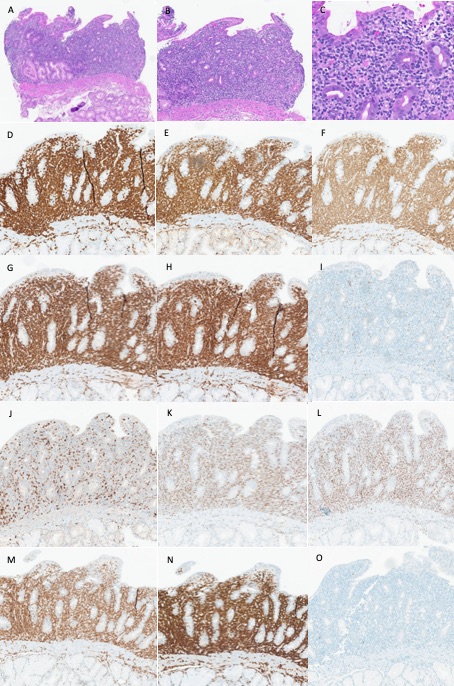Sunday Poster Session
Category: Infections and Microbiome
P1345 - Diarrheal Dilemma: A Case of Post-CAR-T T-Cell Lymphoma Presenting as Refractory Diarrhea
Sunday, October 26, 2025
3:30 PM - 7:00 PM PDT
Location: Exhibit Hall

Luis Zuniga, DO (he/him/his)
University of Nebraska Medical Center
Omaha, NE
Presenting Author(s)
Award: ACG Presidential Poster Award
Luis M. Zuniga, DO, Kyle Scholten, DO, Kevin Brittan, MD, Jason Barbaretta, MD, Jonathan Herskovitz, MD, PhD, Kayla Hoerschgen, MD, Kathryn Hutchins, MD, FACG, Sarah Malik, MD
University of Nebraska Medical Center, Omaha, NE
Introduction: Chimeric Antigen Receptor T-cell (CAR-T) Therapy is an increasingly popular treatment for managing refractory leukemia and lymphoma. Recently, the FDA announced an investigation into CAR-T regimens due to an increase in reports of secondary cancers. One rarely cited secondary cancer is T-cell lymphoma after ciltacabtagene autoleucel (Cilta-cel) in patients with multiple myeloma (MM). We present a case of refractory diarrhea secondary to small bowel T-cell lymphoma.
Case Description/
Methods: A 75-year-old male with a history of multiple myeloma presented to the emergency department with recurrent profuse watery diarrhea four months after completing Cilta-cel therapy. During a recent hospitalization for the same issue, infectious workups and colonoscopy yielded no positive findings. A CT scan revealed intra- and extrahepatic biliary duct dilation, and magnetic resonance cholangiopancreatography (MRCP) indicated common bile duct (CBD) dilation of 1.1 cm with distal narrowing. Additional laboratory tests showed a stool osmotic gap indicative of osmotic diarrhea and an elevated gastrin level. A celiac panel, fecal calprotectin, fecal fat, fecal elastase, serotonin level, VIP level, and 5-HIAA level were all within normal limits. Esophagogastroduodenoscopy combined with endoscopic ultrasound revealed loss of gastric rugae, no intraluminal or pancreatic masses, and infiltration of cytotoxic CD4+ T-cells in the superficial intestinal mucosa. A repeat endoscopy with biopsies demonstrated diffuse cytotoxic T-cell infiltration. In collaboration with Pathology and Oncology, the patient was diagnosed with post-CAR-T T-cell lymphoproliferative disorder of the small bowel. Following interdisciplinary collaboration, infliximab was initiated due to concerns regarding autoimmune etiology; however, the diarrhea worsened. He was switched to high-dose steroids, resulting in improvement, and he was discharged in stable condition on a steroid taper with close follow-up.
Discussion: CAR-T is an increasingly popular treatment for managing refractory leukemia and lymphoma; however, it also has complications. Our patient experienced an exceptionally rare adverse effect several months after treatment for his MM, which is not well documented in the literature. He was eventually diagnosed with refractory diarrhea caused by the development of CD4-positive T-cell lymphoma in the small bowel following treatment with ciltacabragene autoleucel. It is essential to recognize that rare complications can occur with CAR-T therapy.

Figure: Figure 1. Histological and immunohistochemical findings from a small bowel biopsy. (A) Duodenum exhibiting Brunner's glands and an expanded lamina propria, stained with H&E at 4X magnification. (B) Duodenal mucosa showing an expanded lamina propria populated by small, mildly atypical lymphocytes, stained with H&E at 10X magnification. (C) Duodenal mucosa with an expanded lamina propria comprised of small lymphocytes and uninvolved glands, stained with H&E at 40X magnification. (D-O, immunohistochemical stains at 10X) The lymphocytes are positive for CD3 (D), CD5 (E), CD43 (F), CD2 (G), and CD4 (H). CD8 highlights scattered T-cells (I), while CD7 shows partial loss (J). Furthermore, the CD4+ lymphoid population is positive for TIA-1 (K), granzyme B (L), PD-1 (M), and TCR-βF1 (N), while negative for TCR GM1 (O).
Disclosures:
Luis Zuniga indicated no relevant financial relationships.
Kyle Scholten indicated no relevant financial relationships.
Kevin Brittan indicated no relevant financial relationships.
Jason Barbaretta indicated no relevant financial relationships.
Jonathan Herskovitz indicated no relevant financial relationships.
Kayla Hoerschgen indicated no relevant financial relationships.
Kathryn Hutchins indicated no relevant financial relationships.
Sarah Malik indicated no relevant financial relationships.
Luis M. Zuniga, DO, Kyle Scholten, DO, Kevin Brittan, MD, Jason Barbaretta, MD, Jonathan Herskovitz, MD, PhD, Kayla Hoerschgen, MD, Kathryn Hutchins, MD, FACG, Sarah Malik, MD. P1345 - Diarrheal Dilemma: A Case of Post-CAR-T T-Cell Lymphoma Presenting as Refractory Diarrhea, ACG 2025 Annual Scientific Meeting Abstracts. Phoenix, AZ: American College of Gastroenterology.
Luis M. Zuniga, DO, Kyle Scholten, DO, Kevin Brittan, MD, Jason Barbaretta, MD, Jonathan Herskovitz, MD, PhD, Kayla Hoerschgen, MD, Kathryn Hutchins, MD, FACG, Sarah Malik, MD
University of Nebraska Medical Center, Omaha, NE
Introduction: Chimeric Antigen Receptor T-cell (CAR-T) Therapy is an increasingly popular treatment for managing refractory leukemia and lymphoma. Recently, the FDA announced an investigation into CAR-T regimens due to an increase in reports of secondary cancers. One rarely cited secondary cancer is T-cell lymphoma after ciltacabtagene autoleucel (Cilta-cel) in patients with multiple myeloma (MM). We present a case of refractory diarrhea secondary to small bowel T-cell lymphoma.
Case Description/
Methods: A 75-year-old male with a history of multiple myeloma presented to the emergency department with recurrent profuse watery diarrhea four months after completing Cilta-cel therapy. During a recent hospitalization for the same issue, infectious workups and colonoscopy yielded no positive findings. A CT scan revealed intra- and extrahepatic biliary duct dilation, and magnetic resonance cholangiopancreatography (MRCP) indicated common bile duct (CBD) dilation of 1.1 cm with distal narrowing. Additional laboratory tests showed a stool osmotic gap indicative of osmotic diarrhea and an elevated gastrin level. A celiac panel, fecal calprotectin, fecal fat, fecal elastase, serotonin level, VIP level, and 5-HIAA level were all within normal limits. Esophagogastroduodenoscopy combined with endoscopic ultrasound revealed loss of gastric rugae, no intraluminal or pancreatic masses, and infiltration of cytotoxic CD4+ T-cells in the superficial intestinal mucosa. A repeat endoscopy with biopsies demonstrated diffuse cytotoxic T-cell infiltration. In collaboration with Pathology and Oncology, the patient was diagnosed with post-CAR-T T-cell lymphoproliferative disorder of the small bowel. Following interdisciplinary collaboration, infliximab was initiated due to concerns regarding autoimmune etiology; however, the diarrhea worsened. He was switched to high-dose steroids, resulting in improvement, and he was discharged in stable condition on a steroid taper with close follow-up.
Discussion: CAR-T is an increasingly popular treatment for managing refractory leukemia and lymphoma; however, it also has complications. Our patient experienced an exceptionally rare adverse effect several months after treatment for his MM, which is not well documented in the literature. He was eventually diagnosed with refractory diarrhea caused by the development of CD4-positive T-cell lymphoma in the small bowel following treatment with ciltacabragene autoleucel. It is essential to recognize that rare complications can occur with CAR-T therapy.

Figure: Figure 1. Histological and immunohistochemical findings from a small bowel biopsy. (A) Duodenum exhibiting Brunner's glands and an expanded lamina propria, stained with H&E at 4X magnification. (B) Duodenal mucosa showing an expanded lamina propria populated by small, mildly atypical lymphocytes, stained with H&E at 10X magnification. (C) Duodenal mucosa with an expanded lamina propria comprised of small lymphocytes and uninvolved glands, stained with H&E at 40X magnification. (D-O, immunohistochemical stains at 10X) The lymphocytes are positive for CD3 (D), CD5 (E), CD43 (F), CD2 (G), and CD4 (H). CD8 highlights scattered T-cells (I), while CD7 shows partial loss (J). Furthermore, the CD4+ lymphoid population is positive for TIA-1 (K), granzyme B (L), PD-1 (M), and TCR-βF1 (N), while negative for TCR GM1 (O).
Disclosures:
Luis Zuniga indicated no relevant financial relationships.
Kyle Scholten indicated no relevant financial relationships.
Kevin Brittan indicated no relevant financial relationships.
Jason Barbaretta indicated no relevant financial relationships.
Jonathan Herskovitz indicated no relevant financial relationships.
Kayla Hoerschgen indicated no relevant financial relationships.
Kathryn Hutchins indicated no relevant financial relationships.
Sarah Malik indicated no relevant financial relationships.
Luis M. Zuniga, DO, Kyle Scholten, DO, Kevin Brittan, MD, Jason Barbaretta, MD, Jonathan Herskovitz, MD, PhD, Kayla Hoerschgen, MD, Kathryn Hutchins, MD, FACG, Sarah Malik, MD. P1345 - Diarrheal Dilemma: A Case of Post-CAR-T T-Cell Lymphoma Presenting as Refractory Diarrhea, ACG 2025 Annual Scientific Meeting Abstracts. Phoenix, AZ: American College of Gastroenterology.

